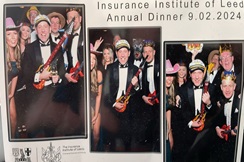Blog Articles
Latest Articles
Blog
- 13/01/2025
- Supporting The Leeds South and East Foodbank
 Responding to a plea for assistance from our friends in the insurance community, the Team at Aston Charles leaped into action and volunteered to help collect much needed supplies for the Leeds South and East Foodbank. The Insurance Institute of Leeds and Emerging Insurance Professionals (Leeds Institute) set off to Tesco in Garforth to collect financial and food donations from passing shoppers. Between them, the team filled 22 crates (and counting!) and raised over £100 for the Trussell Trust, who distribute food to needy local families. For more information or to support the Leeds South and East Food bank, please visit https://leedssouthandeast.foodbank.org.uk...
Responding to a plea for assistance from our friends in the insurance community, the Team at Aston Charles leaped into action and volunteered to help collect much needed supplies for the Leeds South and East Foodbank. The Insurance Institute of Leeds and Emerging Insurance Professionals (Leeds Institute) set off to Tesco in Garforth to collect financial and food donations from passing shoppers. Between them, the team filled 22 crates (and counting!) and raised over £100 for the Trussell Trust, who distribute food to needy local families. For more information or to support the Leeds South and East Food bank, please visit https://leedssouthandeast.foodbank.org.uk...- 20/11/2024
- Will New Vehicle Risk Ratings Disadvantage Electric Fleets?
 Will New Vehicle Risk Ratings Disadvantage Electric Fleets?Recent decades have seen a global push towards net zero and sustainability, with lots of large companies looking for ways in which they can become more environmentally friendly.More recently, many businesses that own vehicles have started building up fleets of electric vehicles, with a view to reducing their carbon outputs.However, a recent update in the way that insurance is categorised may have an impact on decisions around new EV purchases, with some concern that there might be an increase in costs. But is this really an issue?What are the new Vehicle Risk Ratings?In 2024 the car insurance industry, led by Thatcham Research, announced a new system for categorising insurance ratings, with the former Insurance Groups Ratings Scheme being replaced by a new Vehicle Risks Ratings (VRRs) System. The idea of the new system is that a car purchaser will be able get a clear picture of the cost of insurance prior to making a purchase. Under the new system, a car’s ranking may change after purchase has been made, leading to the insurance category of a vehicle changing over time.The VRR system will assess cars over five key elements; performance, damageability, repairability, safety and security.[i] Each of these five assessments will be given a score between 1 and 99. [ii] This is almost double the score of the current Insurance Groups Ratings Scheme (which is from 1 – 50).Will this increase the insurance for Electric Vehicles?Some commentators on the new model have pointed out that the new “repairability” aspect of VRR will disproportionately affect Electric Vehicles. The repairability category has the highest weighting for insurers, so this is really key. [iii] The assessment of repairability will take into account the ease and expense with which a vehicle can be repaired; with electric vehicles likely to take a hard hit in this area, due to a variety of factors, including the current difficulty in ...
Will New Vehicle Risk Ratings Disadvantage Electric Fleets?Recent decades have seen a global push towards net zero and sustainability, with lots of large companies looking for ways in which they can become more environmentally friendly.More recently, many businesses that own vehicles have started building up fleets of electric vehicles, with a view to reducing their carbon outputs.However, a recent update in the way that insurance is categorised may have an impact on decisions around new EV purchases, with some concern that there might be an increase in costs. But is this really an issue?What are the new Vehicle Risk Ratings?In 2024 the car insurance industry, led by Thatcham Research, announced a new system for categorising insurance ratings, with the former Insurance Groups Ratings Scheme being replaced by a new Vehicle Risks Ratings (VRRs) System. The idea of the new system is that a car purchaser will be able get a clear picture of the cost of insurance prior to making a purchase. Under the new system, a car’s ranking may change after purchase has been made, leading to the insurance category of a vehicle changing over time.The VRR system will assess cars over five key elements; performance, damageability, repairability, safety and security.[i] Each of these five assessments will be given a score between 1 and 99. [ii] This is almost double the score of the current Insurance Groups Ratings Scheme (which is from 1 – 50).Will this increase the insurance for Electric Vehicles?Some commentators on the new model have pointed out that the new “repairability” aspect of VRR will disproportionately affect Electric Vehicles. The repairability category has the highest weighting for insurers, so this is really key. [iii] The assessment of repairability will take into account the ease and expense with which a vehicle can be repaired; with electric vehicles likely to take a hard hit in this area, due to a variety of factors, including the current difficulty in ...- 20/11/2024
- Carbon insurance: What is it, and why does it matter?
 Carbon insurance: What is it, and why does it matter?Over recent decades, most corporations have become increasingly aware - and concerned about - their responsibility towards the planet. Since at least the 1990’s, there has been a strong push globally towards sustainability, averting climate change and achieving “net zero” carbon emissions.However, for many businesses, the releasing of some level of carbon during their operations is inevitable. In response to this problem, a new market has emerged, known as carbon offsetting. The insurance industry has not been far behind, offering a “carbon insurance” to support this emerging sector. This new type of insurance has a number of challenges but is vital to the carbon offsetting model.What is carbon offsetting, and what are carbon credits?Finding ways to reduce and offset emissions is not a brand-new concept. Ways to stop climate change were discussed at the 1992 Earth Summit (from which the United Nations Framework Convention for Climate Change was born in 1994). The UNFCCC is now ratified by 198 Countries.[i]The Paris Agreement of 2015 was an international treaty focused on stopping climate change. It has further led to countries developing targets and regulations. [ii]In addition to legislation mandating that companies limit or offset any carbon that they produce, consumers are voting with their feet and are increasingly supporting businesses that are conscious of their environmental impact. All this creates a situation in which businesses are both constrained to reduce and offset carbon emissions (through “compliance”) and are also often voluntarily going above and beyond even what legislation forces them to do (through “voluntary” offsets).Often, regulations will mandate a “cap” on the amount of carbon that a company can produce. This can then create a situation in which companies trade carbon credits between themselves. Companies who are under their cap may sell carbon credits to companies that go over ...
Carbon insurance: What is it, and why does it matter?Over recent decades, most corporations have become increasingly aware - and concerned about - their responsibility towards the planet. Since at least the 1990’s, there has been a strong push globally towards sustainability, averting climate change and achieving “net zero” carbon emissions.However, for many businesses, the releasing of some level of carbon during their operations is inevitable. In response to this problem, a new market has emerged, known as carbon offsetting. The insurance industry has not been far behind, offering a “carbon insurance” to support this emerging sector. This new type of insurance has a number of challenges but is vital to the carbon offsetting model.What is carbon offsetting, and what are carbon credits?Finding ways to reduce and offset emissions is not a brand-new concept. Ways to stop climate change were discussed at the 1992 Earth Summit (from which the United Nations Framework Convention for Climate Change was born in 1994). The UNFCCC is now ratified by 198 Countries.[i]The Paris Agreement of 2015 was an international treaty focused on stopping climate change. It has further led to countries developing targets and regulations. [ii]In addition to legislation mandating that companies limit or offset any carbon that they produce, consumers are voting with their feet and are increasingly supporting businesses that are conscious of their environmental impact. All this creates a situation in which businesses are both constrained to reduce and offset carbon emissions (through “compliance”) and are also often voluntarily going above and beyond even what legislation forces them to do (through “voluntary” offsets).Often, regulations will mandate a “cap” on the amount of carbon that a company can produce. This can then create a situation in which companies trade carbon credits between themselves. Companies who are under their cap may sell carbon credits to companies that go over ...- 20/11/2024
- The Insurance Institute of Leeds: Embracing Risk – Living Life Without Limits
 The Insurance Institute of Leeds: Embracing Risk – Living Life Without LimitsThe Aston Charles Team were delighted to be invited by our friends at The Insurance Institute of Leeds to attend their most recent event.Hosted at the Carriage Works in Leeds City Centre, the event was delivered by the former Royal Marine Commando, Covert Operations Leader and successful entrepreneur turned public speaker, Mike Bates. Pitching to a roomful of insurance professionals, it was truly fascinating to hear how Mike (who is being increasingly referred to in the press as ‘The Real Life James Bond’) has experience of handling a vast amount of complex risks, including things such as Combat Tours of Afghanistan, Anti-Terror undercover work, and rowing solo across the Atlantic Ocean! This gave us all an insight into: Appreciation of risk and how to adapt attitudes towards risk. How to boost mental resilience – business and personal. How to adapt to difficult situations and think more clearly. Understanding how to unlock your personal potential. Mike’s hour-long talk flew by in what seemed like no time at all, and we were all in agreement that Mike is a highly entertaining, thought-provoking and inspirational speaker. Speaking to fellow attendees after the event, it was obvious that everyone really enjoyed the talk and took a lot away that they could use in their personal and professional lives....
The Insurance Institute of Leeds: Embracing Risk – Living Life Without LimitsThe Aston Charles Team were delighted to be invited by our friends at The Insurance Institute of Leeds to attend their most recent event.Hosted at the Carriage Works in Leeds City Centre, the event was delivered by the former Royal Marine Commando, Covert Operations Leader and successful entrepreneur turned public speaker, Mike Bates. Pitching to a roomful of insurance professionals, it was truly fascinating to hear how Mike (who is being increasingly referred to in the press as ‘The Real Life James Bond’) has experience of handling a vast amount of complex risks, including things such as Combat Tours of Afghanistan, Anti-Terror undercover work, and rowing solo across the Atlantic Ocean! This gave us all an insight into: Appreciation of risk and how to adapt attitudes towards risk. How to boost mental resilience – business and personal. How to adapt to difficult situations and think more clearly. Understanding how to unlock your personal potential. Mike’s hour-long talk flew by in what seemed like no time at all, and we were all in agreement that Mike is a highly entertaining, thought-provoking and inspirational speaker. Speaking to fellow attendees after the event, it was obvious that everyone really enjoyed the talk and took a lot away that they could use in their personal and professional lives....- 15/10/2024
- Markel’s New Leeds City Centre Office
 The team were delighted to be invited to the opening of Markel’s new office in Leeds city centre recently.With a coveted 5-star ratings report, Markel are currently ranked as the No 1 Commercial Lines Insurer in the UK according to the Insurance Times Broker Satisfaction Survey, and have traded out of the city for nearly 35 years, employing over 150 employees locally.Hosted by well-known local broadcasting sensation, the ever-fabulous Steph Hirst, and attended by Leeds’ very own Olympian siblings, Jonny and Alistair Brownlee, this was a glamourous but still very down-to-earth Yorkshire affair. As well as a fantastic buffet lunch, and some fascinating talks from both Makel top brass and the Brownless alike, attendees were treated to a tour of the new office, occupying 20,000 square feet of two of the upper floors of Leeds’ newest sky scraper, No1 City Square. Explaining the need for the relocation, Neil Galjaard, Markel’s Divisional Managing Director for the UK, said: “Leeds has been a fantastic base for the business, fuelling our growth over the past three decades and we’re pleased to be increasing our investment in the city for the long term with a new office” He continues “Over our time in Leeds we’ve grown from a small operation to being a major employer and consider our people our greatest strength. As a people-first business, we’re excited to welcome employees, partners and customers to our new office. With continued projected growth, our new Leeds base will support our growing teams as they continue their award-winning work, championing customers and creating bespoke solutions that provide meaningful support to businesses across the country.”Aston Charles’ Director, Richard Jones, said “Markel have long been known as one of the go-to insurers in the Leeds market for insurance professionals seeking a challenging and rewarding career, so it’s great see them commit to the region with the acquisition of such quality offices. It is a real ...
The team were delighted to be invited to the opening of Markel’s new office in Leeds city centre recently.With a coveted 5-star ratings report, Markel are currently ranked as the No 1 Commercial Lines Insurer in the UK according to the Insurance Times Broker Satisfaction Survey, and have traded out of the city for nearly 35 years, employing over 150 employees locally.Hosted by well-known local broadcasting sensation, the ever-fabulous Steph Hirst, and attended by Leeds’ very own Olympian siblings, Jonny and Alistair Brownlee, this was a glamourous but still very down-to-earth Yorkshire affair. As well as a fantastic buffet lunch, and some fascinating talks from both Makel top brass and the Brownless alike, attendees were treated to a tour of the new office, occupying 20,000 square feet of two of the upper floors of Leeds’ newest sky scraper, No1 City Square. Explaining the need for the relocation, Neil Galjaard, Markel’s Divisional Managing Director for the UK, said: “Leeds has been a fantastic base for the business, fuelling our growth over the past three decades and we’re pleased to be increasing our investment in the city for the long term with a new office” He continues “Over our time in Leeds we’ve grown from a small operation to being a major employer and consider our people our greatest strength. As a people-first business, we’re excited to welcome employees, partners and customers to our new office. With continued projected growth, our new Leeds base will support our growing teams as they continue their award-winning work, championing customers and creating bespoke solutions that provide meaningful support to businesses across the country.”Aston Charles’ Director, Richard Jones, said “Markel have long been known as one of the go-to insurers in the Leeds market for insurance professionals seeking a challenging and rewarding career, so it’s great see them commit to the region with the acquisition of such quality offices. It is a real ...- 01/07/2024
- Insurance Specific Employee Health & Wellbeing Opportunity
 Our exciting new collaboration – Insurance Specific Employee Health & Wellbeing OpportunityEmployee health and wellbeing is a massively important subject, and it’s great to see so many of our insurance clients taking this so seriously.To us, it’s a bit of a no-brainer; a happier, healthier team will lead to – Increased productivity Minimal lost hours to sickness Talent acquisition & staff retention A work force of high energy, company ambassadors that are engaged with your goals But where do you start? Not all firms have the time or budget to roll out their own inhouse programme, and let's face it - employee surveys may not be as honest if you know the person who is responsible for your pay review is going to be reading it!So, we’ve teamed up with the lovely Lisa Kempster, who may many of you know – she enjoyed a successful career as an insurance recruiter prior to setting up her own Health & Well being practice. Lisa’s got over 15 years’ experience of partnering with insurance businesses so understands the challenges of the job, the industry, along with the importance of return on your investment. To top that off, Lisa is partnering as a Consultant with West Yorkshire Business Boost, so you may be able to claim back 50% of the cost of your programme, regardless of where you are based (broker clients – you’ll be glad to know she won’t be adding VAT to your invoice either)!...
Our exciting new collaboration – Insurance Specific Employee Health & Wellbeing OpportunityEmployee health and wellbeing is a massively important subject, and it’s great to see so many of our insurance clients taking this so seriously.To us, it’s a bit of a no-brainer; a happier, healthier team will lead to – Increased productivity Minimal lost hours to sickness Talent acquisition & staff retention A work force of high energy, company ambassadors that are engaged with your goals But where do you start? Not all firms have the time or budget to roll out their own inhouse programme, and let's face it - employee surveys may not be as honest if you know the person who is responsible for your pay review is going to be reading it!So, we’ve teamed up with the lovely Lisa Kempster, who may many of you know – she enjoyed a successful career as an insurance recruiter prior to setting up her own Health & Well being practice. Lisa’s got over 15 years’ experience of partnering with insurance businesses so understands the challenges of the job, the industry, along with the importance of return on your investment. To top that off, Lisa is partnering as a Consultant with West Yorkshire Business Boost, so you may be able to claim back 50% of the cost of your programme, regardless of where you are based (broker clients – you’ll be glad to know she won’t be adding VAT to your invoice either)!...- 01/07/2024
- Cryptocurrency: A Wealth of Opportunity for the Insurance Market
 Cryptocurrency: A Wealth of Opportunity for the Insurance MarketSince the development of Bitcoin in 2009, cryptocurrency has been an innovative new player in the financial sector; a groundbreaking way to own wealth outside of fiat currency. With the growth of cryptocurrency, there has come an array of new risks, as cyber criminals have become aware that exploitation of this new arena can be highly lucrative. It is estimated that in 2022, there were about $3.7 billion in crypto losses.[i] Inevitably, this kind of risk has presented both a challenge and an opportunity for the insurance market, as insurers have the chance to work alongside the cryptocurrency sector, offering risk mitigation and financial protection.An opportunityWhile cryptocurrency has grown in leaps and bounds over the past 15 years, it appears that, for the moment, the insurance sector is playing catch-up. In 2023, Evertas, a large Cryptocurrency insurer, estimated that a mere 2-3% of crypto assets were insured globally.[ii] Now is the opportunity for forward thinking insurance organisations to step up to the plate in this arena; offering value for money insurance policies and support with risk mitigation to the businesses making their money from cryptocurrency.What type of insurance?Different companies make money from cryptocurrency in different ways; from mining new coins, to storing keys for themselves or clients, or managing transactions. A good insurance broker will need to look at exactly what services the business provides and at what volume. They can then offer advice on the optimum insurance policy, to ensure that the business is not underinsured, and that they have access to a value-for-money policy that covers all the risks. This offering is likely to be across a number of kinds of insurance which could include the following:Cyber insuranceOne of the most obvious insurance requirements for a cryptocurrency business is insurance against cyber-attacks. Naturally, a wealth which is both ...
Cryptocurrency: A Wealth of Opportunity for the Insurance MarketSince the development of Bitcoin in 2009, cryptocurrency has been an innovative new player in the financial sector; a groundbreaking way to own wealth outside of fiat currency. With the growth of cryptocurrency, there has come an array of new risks, as cyber criminals have become aware that exploitation of this new arena can be highly lucrative. It is estimated that in 2022, there were about $3.7 billion in crypto losses.[i] Inevitably, this kind of risk has presented both a challenge and an opportunity for the insurance market, as insurers have the chance to work alongside the cryptocurrency sector, offering risk mitigation and financial protection.An opportunityWhile cryptocurrency has grown in leaps and bounds over the past 15 years, it appears that, for the moment, the insurance sector is playing catch-up. In 2023, Evertas, a large Cryptocurrency insurer, estimated that a mere 2-3% of crypto assets were insured globally.[ii] Now is the opportunity for forward thinking insurance organisations to step up to the plate in this arena; offering value for money insurance policies and support with risk mitigation to the businesses making their money from cryptocurrency.What type of insurance?Different companies make money from cryptocurrency in different ways; from mining new coins, to storing keys for themselves or clients, or managing transactions. A good insurance broker will need to look at exactly what services the business provides and at what volume. They can then offer advice on the optimum insurance policy, to ensure that the business is not underinsured, and that they have access to a value-for-money policy that covers all the risks. This offering is likely to be across a number of kinds of insurance which could include the following:Cyber insuranceOne of the most obvious insurance requirements for a cryptocurrency business is insurance against cyber-attacks. Naturally, a wealth which is both ...- 02/05/2024
- Aston Charles Sponsors Insurance Institute of Leeds 134rd Annual Dinner
 Aston Charles Sponsors Insurance Institute of Leeds 134rd Annual DinnerOnce again, Aston Charles sponsored the Insurance Institute of Leeds Annual Dinner. For many, the ‘Annual Do’ is the highlight of the Yorkshire insurance community’s calendar, and this year certainly didn’t disappoint. In a slight change to the usual format, the formalities were unexpectedly paused by the armouries’ staff to make a surprise announcement – only to reveal they were actually the musical group ‘The Singing Waiters’ who launched into an array of dancing-floor filling party favourites and, perhaps most notably, a conga-dance around the Royal Armouries’ New Dock Hall featuring the cream of the Yorkshire insurance market!The team were joined by guests from UK Global (Part of The Howden Group), Willis Towers Watson, CNA Hardy and Schofield Insurance Brokers (Ethos Broking). The event was raising money for the Chartered Insurance Institute’s ‘The Insurance Charities’ as well as IIL’s President, Kate Edmondson’s chosen charity for the year, Sue Ryder Manorlands Hospice. The event’s other headline sponsors include Marsh, Liberty Speciality Markets, and the Bespoke Group....
Aston Charles Sponsors Insurance Institute of Leeds 134rd Annual DinnerOnce again, Aston Charles sponsored the Insurance Institute of Leeds Annual Dinner. For many, the ‘Annual Do’ is the highlight of the Yorkshire insurance community’s calendar, and this year certainly didn’t disappoint. In a slight change to the usual format, the formalities were unexpectedly paused by the armouries’ staff to make a surprise announcement – only to reveal they were actually the musical group ‘The Singing Waiters’ who launched into an array of dancing-floor filling party favourites and, perhaps most notably, a conga-dance around the Royal Armouries’ New Dock Hall featuring the cream of the Yorkshire insurance market!The team were joined by guests from UK Global (Part of The Howden Group), Willis Towers Watson, CNA Hardy and Schofield Insurance Brokers (Ethos Broking). The event was raising money for the Chartered Insurance Institute’s ‘The Insurance Charities’ as well as IIL’s President, Kate Edmondson’s chosen charity for the year, Sue Ryder Manorlands Hospice. The event’s other headline sponsors include Marsh, Liberty Speciality Markets, and the Bespoke Group....- 17/04/2024
- Aston Charles hosts a charity insurance Darts evening
 Aston Charles hosts a charity insurance community Darts evening, on behalf of Simon on the Streets.After the success of our previous charity nights for our friends and clients in the insurance industry, such as a Curling evening and a Go-Karting night, the team at Aston Charles had been thinking about organising another event for a couple of weeks. By chance, we were having a catch up in Leeds city centre, and bumped into a couple of our Broker friends who were attending a networking event for Simon on the Streets in the bar next door. We were promptly invited to join in the fun and meet attendees including, amongst others, Leo Jones-Rowe, who alongside the day job of being a Partner of Schofield Sweeney, is also Chair of Simon on the Streets. Always one to call out Richard’s procrastination, Annie and James were quick to suggest that we support Simon on the Streets for our next event and, and as many of our clients enjoy Darts (and not to mention the ‘Luke Littler Effect’!) we promptly decided to hire a floor of Flight Club on Park Row, Leeds.Fast-forward a couple of weeks, and we were delighted to host insurance professionals from across the UK at our event. The winner of the individual trophy was Craig Dinnewell of UK Global (Part of Howden Group), with silver and bronze medals going to Tom O’Connell (C&C Insurance Brokers) and Rhys Jones (also UK Global) respectively. This meant that UK Global also picked up the Team Trophy, winning a complementary round of Darts – kindly donated by the team at Flight Club Leeds. As well as being joined by many of our insurance contacts, we were also joined by our friends from the legal sector such as DWF and, of course, Schofield Sweeney. Simon on the Streets is an independent charity offering emotional and practical support for homeless and vulnerable people to enable them to achieve their goals....
Aston Charles hosts a charity insurance community Darts evening, on behalf of Simon on the Streets.After the success of our previous charity nights for our friends and clients in the insurance industry, such as a Curling evening and a Go-Karting night, the team at Aston Charles had been thinking about organising another event for a couple of weeks. By chance, we were having a catch up in Leeds city centre, and bumped into a couple of our Broker friends who were attending a networking event for Simon on the Streets in the bar next door. We were promptly invited to join in the fun and meet attendees including, amongst others, Leo Jones-Rowe, who alongside the day job of being a Partner of Schofield Sweeney, is also Chair of Simon on the Streets. Always one to call out Richard’s procrastination, Annie and James were quick to suggest that we support Simon on the Streets for our next event and, and as many of our clients enjoy Darts (and not to mention the ‘Luke Littler Effect’!) we promptly decided to hire a floor of Flight Club on Park Row, Leeds.Fast-forward a couple of weeks, and we were delighted to host insurance professionals from across the UK at our event. The winner of the individual trophy was Craig Dinnewell of UK Global (Part of Howden Group), with silver and bronze medals going to Tom O’Connell (C&C Insurance Brokers) and Rhys Jones (also UK Global) respectively. This meant that UK Global also picked up the Team Trophy, winning a complementary round of Darts – kindly donated by the team at Flight Club Leeds. As well as being joined by many of our insurance contacts, we were also joined by our friends from the legal sector such as DWF and, of course, Schofield Sweeney. Simon on the Streets is an independent charity offering emotional and practical support for homeless and vulnerable people to enable them to achieve their goals....- 16/04/2024
- The Insurance Industry: Reacting to a Disrupted Market
 The Insurance Industry: Reacting to a Disrupted MarketAs the insurance sector surveys the landscape for 2024 and beyond, there are a number of changes in sight. New technology, extreme events and changing cultures are all shifting the way Property and Casualty insurance needs to operate. Some of these new factors create opportunities, while others create risks; many offer both.Responding to market disruption is nothing new for P&C insurance. While the specific factors may be unprecedented, the insurance sector has always been at the forefront of predicting and responding to new risks.In this article we will look at some of the key elements that are changing (or are set to change) the industry within the next few years.Artificial IntelligenceIt is impossible to discuss disruptive markets without talking about AI. Artificial Intelligence has been on the scene for a few years now, but as it continues to develop, it brings about innovation and opportunity, while also creating risk, uncertainty, and potential problems. Almost all industries need to adapt to a world where AI is commonplace.AI offers massive opportunity to the insurance industry. It can reduce risk, increase speed and refine processes across the board. AI can interact with clients in a more supportive way than ever, meeting their requirements and even anticipating their needs in a way that has not been possible before. At the same time, lots of clients struggle with the impersonal nature of AI – although this is improving all the time, as it becomes more adept at mimicking human emotional responses. Of course, there are dangers that come with computer learned behaviours. One recognised risk is that AI is vulnerable to using data to inadvertently create an illegal or unethical bias – for example, a bias against a protected group. This could result in fines and legal sanctioning, as well as a significant loss of trust in the methods being used by the industry. As this is already a recognised risk, ...
The Insurance Industry: Reacting to a Disrupted MarketAs the insurance sector surveys the landscape for 2024 and beyond, there are a number of changes in sight. New technology, extreme events and changing cultures are all shifting the way Property and Casualty insurance needs to operate. Some of these new factors create opportunities, while others create risks; many offer both.Responding to market disruption is nothing new for P&C insurance. While the specific factors may be unprecedented, the insurance sector has always been at the forefront of predicting and responding to new risks.In this article we will look at some of the key elements that are changing (or are set to change) the industry within the next few years.Artificial IntelligenceIt is impossible to discuss disruptive markets without talking about AI. Artificial Intelligence has been on the scene for a few years now, but as it continues to develop, it brings about innovation and opportunity, while also creating risk, uncertainty, and potential problems. Almost all industries need to adapt to a world where AI is commonplace.AI offers massive opportunity to the insurance industry. It can reduce risk, increase speed and refine processes across the board. AI can interact with clients in a more supportive way than ever, meeting their requirements and even anticipating their needs in a way that has not been possible before. At the same time, lots of clients struggle with the impersonal nature of AI – although this is improving all the time, as it becomes more adept at mimicking human emotional responses. Of course, there are dangers that come with computer learned behaviours. One recognised risk is that AI is vulnerable to using data to inadvertently create an illegal or unethical bias – for example, a bias against a protected group. This could result in fines and legal sanctioning, as well as a significant loss of trust in the methods being used by the industry. As this is already a recognised risk, ...